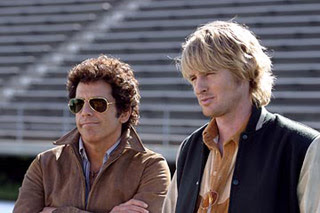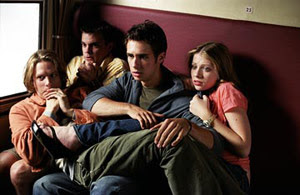When it comes to movie manipulation, Charlie Kaufman has turned what should be a shameless gimmick into something of an art form. Being referred to as the most absurd writer of your generation would be enough of an declaration to undermine the merit of even the most ambitious overachievers, but this is a guy who seems to operate on levels that are immune to criticism. That's because he is first and foremost a visionary, an eccentric but focused man who, unlike countless screenwriters who have tried (and failed) to spur thought on the grounds of extreme silliness, uses the idea of absurdity as a device rather than as a skeleton to drive a premise. Subtract the obvious offbeat details, then, and what you have underneath are generally thought-provoking but straightforward stories. Don't agree? Then take a much closer look at either "Being John Malkovich" or "Adaptation" before you settle on that conclusion.
Wednesday, March 31, 2004
Monday, March 15, 2004
Starsky & Hutch / **1/2 (2004)
A quick ransacking of the filmographies shared between Ben Stiller and Owen Wilson suggests that their casting in the leads of "Starsky & Hutch" is more than just an act of coincidence. Hard-hitting movie comedians who tend to flout the most absurd expectations of audiences, the two have actually appeared in five pictures together prior to this outing, a couple being fairly detached collaborations ("The Cable Guy" and "Permanent Midnight"), but others (like their most recent, "Zoolander") evoking the sentiment that they have somehow been appointed the next big comedy duo for the big screen. In any case, we seem to be heading towards the notion that their careers in this profession require a certain amount of shared dependency. There will, of course, always be projects for them that require solitude, but a thread of connection has been established that will no doubt require new stitches being added ever so often.
Secret Window / *** (2004)
Mort Rainey is not the man he used to be. Emotionally skewed by the discovery of his wife's adultery and the sequential tension that resulted in their separation, he spends most of his time locked behind the doors of a cabin in the woods, eating and sleeping and then occasionally waking up to write (or delete) a few new lines from a new short story on his laptop computer. His dog, a quiet little mutt who crashes out on a chair in the upstairs foyer, serves as the writer's only source of companionship, especially during moments when he is conscious but only semi-coherent (we gather during an early scene that this is probably the only major contact he's had with anyone in a while). It would, naturally, come as no surprise that the arrival of an outside influence would disrupt any such pattern no matter how mundane it is, but when Mort opens the door one morning and is confronted by a suspicious-looking man, he is literally yanked out of one reality and displaced into another. This, of course, is a setup he could only dream of capturing in one of his various short stories.
Monday, March 8, 2004
Hidalgo / ** (2004)
Joe Johnston's "Hidalgo" is an ambitious horse-racing vehicle in which the horse emerges as the most interesting character in the story. This announcement should not create the impression, though, that we're dealing with a creature that is either very likable or charismatic; rather, it's just that he's surrounded by human characters that in most other movies would likely be disposed of in the first 15 minutes. Starring Viggo Mortensen (of "Lord of the Rings" fame) as real-life cowboy Frank Hopkins, the movie is about the relationship between a man and steed as they travel halfway across the world to compete in a death-defying race on the barren soils of the Arabian desert. Hopkins, of course, is there only partially for the reward money—in essence, the journey is a chance for him to discover himself and realize his personal destiny. In other words, standard stuff.
Thursday, March 4, 2004
Eurotrip / zero stars (2004)
Understanding the motivation behind someone making a film like "Eurotrip" is like trying to understand one's motivation for laughing at it: in both cases, there are no reasons, but just empty excuses. The realm of comedy tends to leave more doors open than most other genres with a knack of stretching standards of taste, but if one thing remains certain in any and all types of movies, it's that no kind of positive response can be warranted to products in which audience response is but a side detail in a filmmaker's grand scheme. Jeff Schaffer, the man who directed the film we have before us, seems to be so amused by the fact that he's enforcing negative stereotypes and offending vast segments of population that he doesn't care about any legitimate element of humor. If you chuckle, it probably means that you are simply having a knee-jerk reaction to the deplorably bad taste the picture utilizes; in any other case, laughing would be a sign that you either have lost touch with reality or are just easily amused by films that lack any sense of judgment. You, my friend, are not the kind of person who should be reading this review.
Monday, March 1, 2004
Full Metal Jacket / **** (1987)
"The Marine Corps does not want robots. The Marine Corps wants killers. The Marine Corps wants to build indestructible men—men without fear."
The Toronto Globe and Mail's Jay Scott once bestowed Stanley Kubrick's "Full Metal Jacket" with the title of "greatest war film ever made," a proclamation that, even during a time when "Schindler's List" had not yet come to fruition, suggested either an act of bravery or one of lunacy on the part of the writer. Indeed, who would be brave enough to make such an announcement without knowing full well the striking power of an "Apocalypse Now" or a "Platoon" beforehand? Absolutely no one. But as odd or misinformed as the announcement might have seemed at the time (partially because Stanley Kubrick's endeavor wasn't initially seen as pure "war" film, per se), it nonetheless holds enough relevance today to be regarded as one of the most honest and forthright ways of describing the film's true power (notice the back of the DVD release quotes that exact line from Scott's critique). This is a movie about mentality and dehumanization rather than any varying degree of bloodshed, and that alone makes it more interesting (and important) than a standard war film that requires characters to shoot at enemies and duck behind obstacles in hopes of escaping injury or death.
The Toronto Globe and Mail's Jay Scott once bestowed Stanley Kubrick's "Full Metal Jacket" with the title of "greatest war film ever made," a proclamation that, even during a time when "Schindler's List" had not yet come to fruition, suggested either an act of bravery or one of lunacy on the part of the writer. Indeed, who would be brave enough to make such an announcement without knowing full well the striking power of an "Apocalypse Now" or a "Platoon" beforehand? Absolutely no one. But as odd or misinformed as the announcement might have seemed at the time (partially because Stanley Kubrick's endeavor wasn't initially seen as pure "war" film, per se), it nonetheless holds enough relevance today to be regarded as one of the most honest and forthright ways of describing the film's true power (notice the back of the DVD release quotes that exact line from Scott's critique). This is a movie about mentality and dehumanization rather than any varying degree of bloodshed, and that alone makes it more interesting (and important) than a standard war film that requires characters to shoot at enemies and duck behind obstacles in hopes of escaping injury or death.
Subscribe to:
Posts (Atom)






